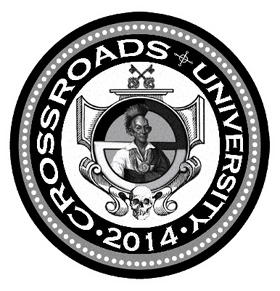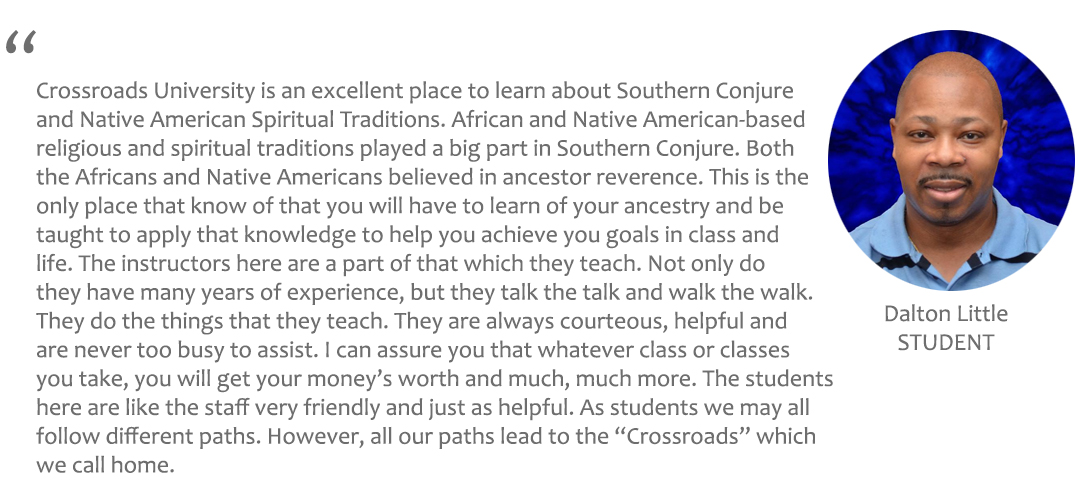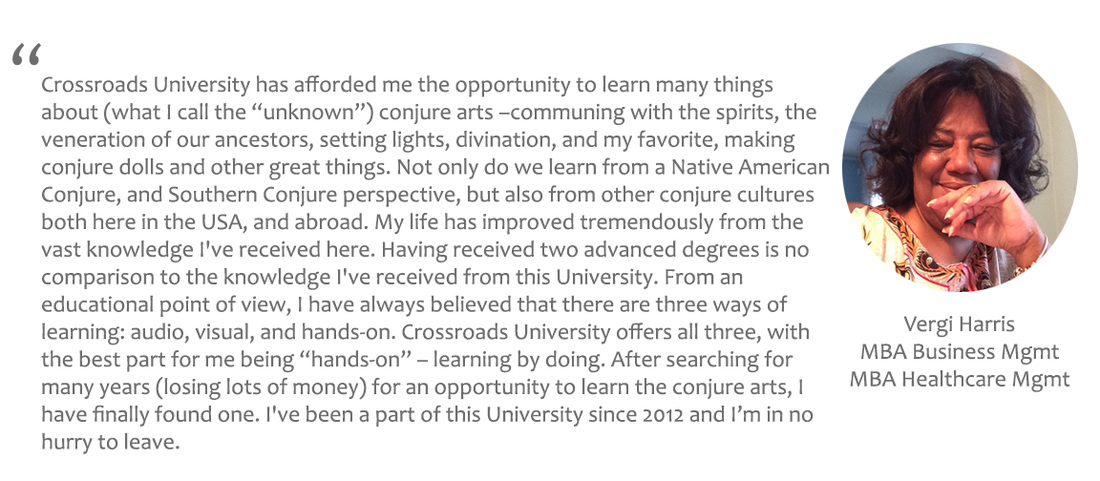Courage is not afraid to weep, and she is not afraid to pray, even when she is not sure who she is praying to. ~ Black Hawk
|
Native American Conjure: Working with Black Hawk and Indian Spirit Guides in the context of Southern Conjure is an advanced, specialized course that teaches about the Native American influences on Hoodoo, Conjure, Spiritualism and New Orleans Voudou, with a special focus on service to Black Hawk.
Description Native American influences on Southern Conjure traditions are both obvious—as in the case of the Powerful Indian products, Indian Head pennies and service to Black Hawk—as well as subtle, as in the use of tobacco and other Native American herbs in old-style conjure works. However, very little has been written about Indian Spirit Guides and Indian influences from the perspective of Southern Conjure. Even less, if anything at all, has been written by a Native American, a Redbone or mixed blood whose predominant spiritual path lies within Southern indigenous roots. As the popularity of Indian conjure rises among modern day rootworkers, an increasing amount of information about Father Black Hawk, Indian Spirit Guides and Indian materia medica is proliferating that has little to do with historical or cultural accuracy. This phenomenon is our motivation for developing this course. From the Native worldview, rootwork is a metaphysical construct referred to as medicine (not unlike the African American perspective of "medzin") and always incorporates an element of spirit and relationship with the medicine into the work. Historically, Native Americans and Africans had medicine people responsible for the treatment of physical and spiritual conditions of their people. While Native Americans are credited for introducing many of the native flora and fauna to African slaves, Africans, in turn, took that knowledge and applied it to their own brand of folk magic and root doctoring. As cultural exchange is seldom one-sided, Native Americans undoubtedly learned a few tricks from their African neighbors, as well. |
Sign up to receive the Crossroads University Newsletter
|
Indian Spirit Guides such as Black Hawk, White Cloud and Sitting Bull, came to southern conjure via the spiritualist movement. There is a strong Spiritualist presence in New Orleans thanks to Mother Leafy Anderson, who is credited for bringing Black Hawk to New Orleans and leaving White Hawk in the North. Black Hawk was her spirit guide, and when she died, Mother Catherine Seals carried on his tradition as head of the Spiritualist Church, relating to Black Hawk as her spirit guide, as well.
Among the many fascinating elements of service to Father Black Hawk is his bucket. Black Hawk’s bucket is very similar to the New Orleans-style ancestral spirit pot reminiscent of the African Congo and the Nganga of Palo Mayombe. There are different kinds of spirit pots, however. For example, one type of spirit pot is created as a space for a particular Spirit to reside in a material vessel through which you interact with the Spirit. The Spirit lives in the pot via a magic contract with the worker and is sometimes restrained with chains or rope. The other type of spirit pot is the kind made as a place for a Spirit to visit when called upon. It is a place where the Spirit can manifest and work with you. The two types of Spirit pots are created in entirely different manners. The latter is the category in which Black Hawk’s bucket falls.
To the Native American, every living thing is a source of spiritual power and as such should be revered. This is similar to the African concept of aché. From the native worldview, however, all living things are also our relations—our relatives—aunt, uncle, sister, brother and cousin. We look to our plant, animal and mineral relations as Bird people or Winged Ones, Fish people, Snake people, Four-leggeds, Animal people, and Tree people. The rocks and minerals are our grandfathers and grandmothers. The elements Lightening and Thunder, Wind and Rain, Earthquake and Fire—all are powers of nature with the ability to transform and teach, as well as to destroy and put us, the two-leggeds, in our place when necessary.
In addition to being relations, animals and plants are also our teachers and guides, protectors and guardians; they are sources of information and supernatural power. Mother Earth is full of supernatural spirits and powers—both positive and negative, physical and spiritual, visible and invisible.
This course explores the historical relationships, similarities and differences between Native peoples, Africans and African Americans, Students will learn about the Melungeon and Black Indians and the significance of the Mardi Gras Indians to New Orleans' cultural and spiritual landscape. From and applied practice perspective, students will learn the correct way to serve Black Hawk, Red Cloud, White Eagle, Geronimo and others in the context of Southern conjure. Instruction is provided for creating a bucket for Black Hawk, and a comprehensive study of Indian materia medica is provided. Other topics include learning a Native Conjure formulary, learning about Thunder Medicine and divination, and many different works with Black Hawk and Native American conjure in general.
Course Objectives
This is a specialized course and is not required for the Certification in Professional Rootwork (C.P.R.) credential, which requires a separate application process. No prerequisites.
Among the many fascinating elements of service to Father Black Hawk is his bucket. Black Hawk’s bucket is very similar to the New Orleans-style ancestral spirit pot reminiscent of the African Congo and the Nganga of Palo Mayombe. There are different kinds of spirit pots, however. For example, one type of spirit pot is created as a space for a particular Spirit to reside in a material vessel through which you interact with the Spirit. The Spirit lives in the pot via a magic contract with the worker and is sometimes restrained with chains or rope. The other type of spirit pot is the kind made as a place for a Spirit to visit when called upon. It is a place where the Spirit can manifest and work with you. The two types of Spirit pots are created in entirely different manners. The latter is the category in which Black Hawk’s bucket falls.
To the Native American, every living thing is a source of spiritual power and as such should be revered. This is similar to the African concept of aché. From the native worldview, however, all living things are also our relations—our relatives—aunt, uncle, sister, brother and cousin. We look to our plant, animal and mineral relations as Bird people or Winged Ones, Fish people, Snake people, Four-leggeds, Animal people, and Tree people. The rocks and minerals are our grandfathers and grandmothers. The elements Lightening and Thunder, Wind and Rain, Earthquake and Fire—all are powers of nature with the ability to transform and teach, as well as to destroy and put us, the two-leggeds, in our place when necessary.
In addition to being relations, animals and plants are also our teachers and guides, protectors and guardians; they are sources of information and supernatural power. Mother Earth is full of supernatural spirits and powers—both positive and negative, physical and spiritual, visible and invisible.
This course explores the historical relationships, similarities and differences between Native peoples, Africans and African Americans, Students will learn about the Melungeon and Black Indians and the significance of the Mardi Gras Indians to New Orleans' cultural and spiritual landscape. From and applied practice perspective, students will learn the correct way to serve Black Hawk, Red Cloud, White Eagle, Geronimo and others in the context of Southern conjure. Instruction is provided for creating a bucket for Black Hawk, and a comprehensive study of Indian materia medica is provided. Other topics include learning a Native Conjure formulary, learning about Thunder Medicine and divination, and many different works with Black Hawk and Native American conjure in general.
Course Objectives
- To explore and gain an appreciation for the relationships between Native Americans, Africans and African Americans
- To become familiar with several Indian Spirit Guides and how to work with them within the context of Southern Conjure
- To learn about the life and experiences of Father Black Hawk and how he fits into contemporary New Orleans Voudou, Spiritualism and Rootwork
- To learn how to serve Black Hawk and create a bucket for him
- To gain an appreciation for and knowledge of Native American materia medica
- To gain an appreciation for and knowledge of Native American Conjure and conjure formulary
- To gain an appreciation for and knowledge of Native American medicine.
This is a specialized course and is not required for the Certification in Professional Rootwork (C.P.R.) credential, which requires a separate application process. No prerequisites.
Hear our Students Testify:
Enrollment Resumes 2020!
The Native American Conjure course is not currently available, however there is a portion of the course that focuses on Black Hawk that is now open for enrollment. To enroll in this course, please visit Black Hawk Conjure Course.
The Native American Conjure course is not currently available, however there is a portion of the course that focuses on Black Hawk that is now open for enrollment. To enroll in this course, please visit Black Hawk Conjure Course.
*Once you have paid for a course, you will receive a welcome email directing you to an online confidentiality form you must sign before given access to the course website. Once you have received access to the course website, there are no refunds.



